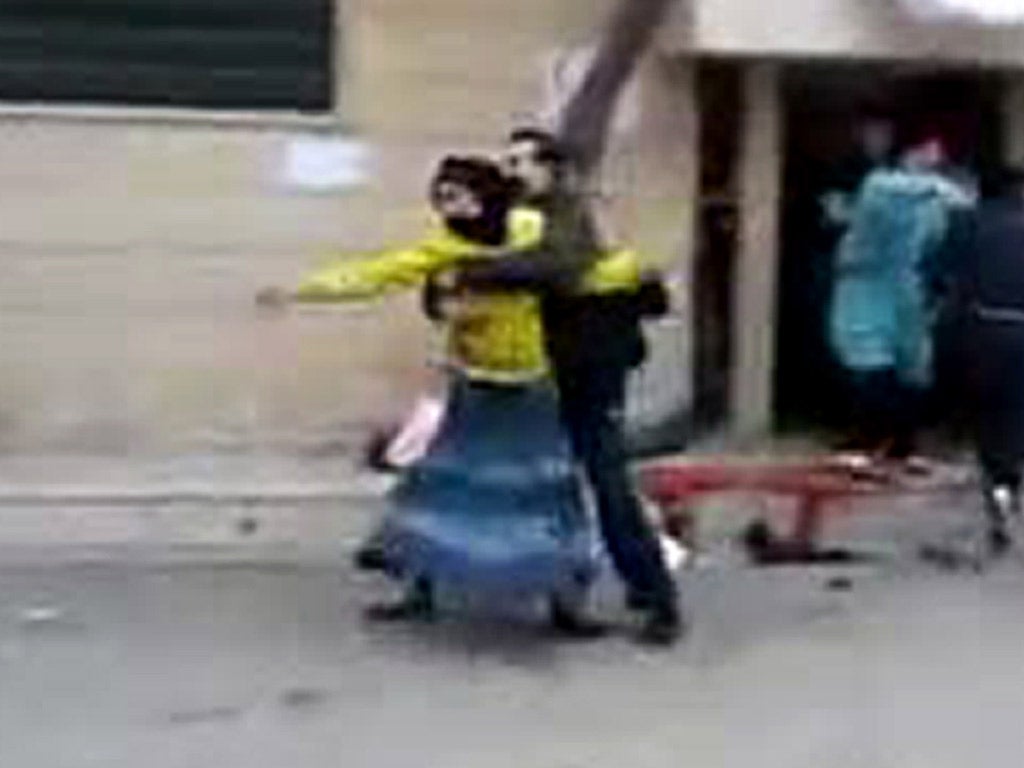Robert Fisk: From Washington this looks like Syria's 'Benghazi moment'. But not from here
Look east and what does Bashar see? Iran standing with him and Iraq refusing to impose sanctions


Your support helps us to tell the story
From reproductive rights to climate change to Big Tech, The Independent is on the ground when the story is developing. Whether it's investigating the financials of Elon Musk's pro-Trump PAC or producing our latest documentary, 'The A Word', which shines a light on the American women fighting for reproductive rights, we know how important it is to parse out the facts from the messaging.
At such a critical moment in US history, we need reporters on the ground. Your donation allows us to keep sending journalists to speak to both sides of the story.
The Independent is trusted by Americans across the entire political spectrum. And unlike many other quality news outlets, we choose not to lock Americans out of our reporting and analysis with paywalls. We believe quality journalism should be available to everyone, paid for by those who can afford it.
Your support makes all the difference.President Bashar al-Assad is not about to go. Not yet. Not, maybe, for quite a long time. Newspapers in the Middle East are filled with stories about whether or not this is Assad's "Benghazi moment" – these reports are almost invariably written from Washington or London or Paris – but few in the region understand how we Westerners can get it so wrong. The old saw has to be repeated and repeated: Egypt was not Tunisia; Bahrain was not Egypt; Yemen was not Bahrain; Libya was not Yemen. And Syria is very definitely not Libya.
It's not difficult to see how the opposite plays in the West. The barrage of horrifying Facebook images from Homs, and statements from the "Free Syrian Army", and the huffing of La Clinton and the amazement that Russia can be so blind to the suffering of Syrians – as if America was anything but blind to the suffering of Palestinians when, say, more than 1,300 were killed in Israel's onslaught on Gaza – doesn't gel with reality on the ground. Why should the Russians care about Homs? Did they care about the dead of Chechnya?
Look at it the other way round. Yes, we all know that Syria's intelligence service has committed human rights abuses. They did that in Lebanon. Yes, we all know this is a regime in Damascus, not an elected government. Yes, we all know about corruption. Yes, we watched the UN's humiliation at the weekend – although why La Clinton should expect the Russians to click their heels after the "no-fly zone" in Libya turned into "regime change" is a bit of a mystery.
The destruction of the Alawite-led government in Syria – which means in effect, a Shia regime – will be a sword in the soul of Shia Iran. And look at the Middle East now from the windows of the massive presidential palace that overlooks the old city of Damascus. True, the Gulf has turned against Syria. True, Turkey has turned against Syria (while generously offering Bashar exile in the old Ottoman empire).
But look east, and what does Bashar see? Loyal Iran standing with him. Loyal Iraq – Iran's new best friend in the Arab world – refusing to impose sanctions. And to the west, loyal little Lebanon refusing to impose sanctions. Thus from the border of Afghanistan to the Mediterranean, Assad has a straight line of alliances which should prevent, at least, his economic collapse.
The trouble is that the West has been so deluged with stories and lectures and think-tank nonsense about the ghastly Iran and the unfaithful Iraq and the vicious Syria and the frightened Lebanon that it is almost impossible to snap off these delusional pictures and realise that Assad is not alone. That is not to praise Assad or to support his continuation. But it's real.
The Turks, after much Clinton-style huffing and puffing, did not follow through on their "cordon sanitaire" in northern Syria. Nor did King Abdullah II follow through on the Syrian opposition's call for a Jordanian "cordon sanitaire" in the south. Oddly, I repeat yet again, only Israel has remained silent.
As long as Syria can trade with Iraq, it can trade with Iran and, of course, it can trade with Lebanon. The Shia of Iran and the Shia majority in Iraq and the Shia leadership (though not majority) in Syria and the Shia (the largest community, but not a majority) in Lebanon will be on Assad's side, however reluctantly. That, I'm afraid, is the way the cookie crumbles. Crazed Gaddafi had real enemies with firepower and Nato. Assad's enemies have Kalashnikovs and no Nato.
Assad has Damascus and Aleppo, and those cities matter. His principal military units have not defected to the opposition.
The "good guys" also contain "bad guys" – a fact we forgot in Libya, even when the "good guys" murdered their defected army commander and tortured prisoners to death. Oh yes, and the Royal Navy was able to put into Benghazi. It cannot put into Tartous because the Russian Navy is still there.
Join our commenting forum
Join thought-provoking conversations, follow other Independent readers and see their replies
Comments